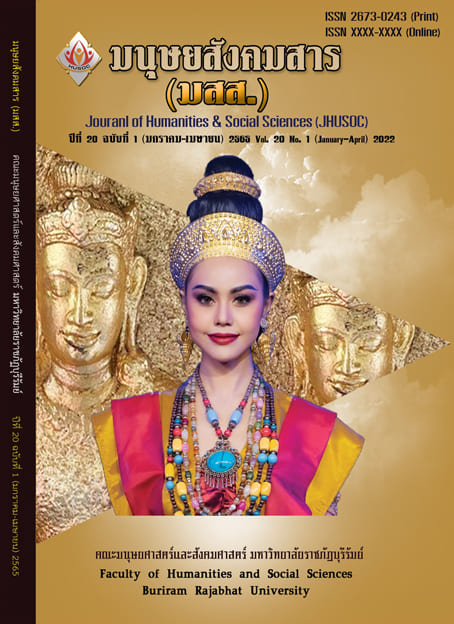A Correlation of Learning Design Experience and Reflective Thinking Ability of Pre-service Teacher
Main Article Content
Abstract
Reflection is considered as a form of assessment as learning that accomplished to self-improvement. According to the study, people with the ability to reflect are often experienced. Therefore, this study is attentive to study the relationship between experience in learning design and the reflection of student teachers and the influence values of experience in learning design and the reflection. This study uses collaborative reflection included self-reflection and peer feedback of 112 bachelor degree general science student teachers obtained by cluster random sampling groups. The data was collected by using reflective journal and semi-structure interview. Pearson correlation and simple linear regression are employed for data analysis. The result shows that there is a relatively low level of relationship. When studying the effect values, experience variables in learning design is 2.70 percent of their self-reflect. The peer feedback ability is not correlated with experience in learning design.
Article Details

This work is licensed under a Creative Commons Attribution-NonCommercial 4.0 International License.
เนื้อหาและข้อมูลในบทความที่ลงตีพิมพ์ในวารสารทดสอบระบบ ThaiJo2 ถือเป็นข้อคิดเห็นและความรับผิดชอบของผู้เขียนบทความโดยตรงซึ่งกองบรรณาธิการวารสาร ไม่จำเป็นต้องเห็นด้วย หรือร่วมรับผิดชอบใดๆ
บทความ ข้อมูล เนื้อหา รูปภาพ ฯลฯ ที่ได้รับการตีพิมพ์ในวารสารทดสอบระบบ ThaiJo2 ถือเป็นลิขสิทธิ์ของวารสารทดสอบระบบ ThaiJo2 หากบุคคลหรือหน่วยงานใดต้องการนำทั้งหมดหรือส่วนหนึ่งส่วนใดไปเผยแพร่ต่อหรือเพื่อกระทำการใดๆ จะต้องได้รับอนุญาตเป็นลายลักอักษรจากวารสารทดสอบระบบ ThaiJo2 ก่อนเท่านั้น
References
Cojorn, K. (2022). A study of preservice teachers’ reflective thinking through lesson study guideline. Journal of Education Prince of Songkla University, 33(3). [in Thai]
Dann, R. (2002). Promoting assessment as learning: Improving the learning process. London: Routledge/Falmer.
Dewey, J. (1938). Experience and education. New York: Macmillan.
Farrell, T. S. C. (2004). Reflective practice in action. Corwin Press.
Fatih, D. (2015). The effect of reflective thinking on the teaching practices of preservice physical education teachers. Educational Research, 25(3), 260-275.
Finlay, L. (2008). Reflecting on reflective practice. PBPL.
Furlong, J. & Maynard, T. (1995). Mentoring student teacher: The growth of professional knowledge. London: Routledge.
Geddis, N. (1993). Transforming subject-matter knowledge: The role of pedagogical content knowledge in learning to reflect on teaching. International Journal of Science Education, 15(6), 673-683.
Ghaye, T. (2010). Teaching and learning through reflective practice: A practical guide for positive action. London: Routledge.
Hord, S. M., Roussin, J. L., & Sommers, W. A. (2009). Guiding professional learning communities: Inspiration, challenge, surprise, and meaning. Thousand Oaks, CA: Corwin.
Ineke, F., Ton, V., Laurinda, L., & Ingvar, T. (1999). Preservice physics teachers and conceptual difficulties on temperature and heat. European Journal of Teacher Education, 22(1), 61-74.
Kagan, D.M. (1992). Professional growth among preservice and beginning teachers. Review of Educational Research, 62(2), 129-169.
Kember, D., Mckey, J., Sinclair, K., & Frances, K. (2008). A four category scheme for coding and assessing the level of reflection in written work. Assessment & Evaluation in Higher Education, 33(4), 369-379.
Kolb, D.A. (1984). Experiential learning: Experience as the source of learning and development. Englewood Cliffs, NJ: Prentice Hall.
Mok, Y. F. (2005). A philosophy of teaching practicum: construction of a personal theory of teaching and learning. Teacher Development, 9(1), 43-57.
Naghdipour, B., & Emeagwali, O. (2013). Assessing the level of reflective thinking in ELT students. Procedia-Social and Behavioral Sciences, 83(2013), 266 -271.
Ono, Y., Chikamori, K., & Rogan, J.M. (2013). How reflective are lesson study discussion sessions? Developing an instrument to analyze collective reflection. International Journal of Education, 5(3), 52-67.
Pimpa, P. (2018). Current Thai studies. Academic Journal of Mahamakut Buddhist University Roi Et Campus, 7(1), 242-249. [in Thai]
Western and Northern Canadian Protocol for Collaboration in Education. (2006). Rethinking classroom assessment with purpose in mind. Manitoba Education, Citizenship and Youth.
Salkind, N. j. (2014). Exploring research (8th ed). Pearson Education, Harlow, Essex.
Sardareh, S. A., & Saad, M. R. M. (2012). A sociocultural perspective on assessment for learning: The case of a Malaysian primary school ESL context. Procedia - Social and Behavioral Sciences, 66(Supplement C), 343-353.
Schön, D. (1987). Educating the reflective practitioner. Jossey Bass.
Schwarz, B., Dreyfus, T., & Hershkowits, N. H. R. (2004). Teacher guidance of knowledge construction. Proceedings of the 28th Conference of the International Group for the Psychology of Mathematics Education. 4, 169-176. http://www.kurims.kyotou.ac.jp/ EMIS/proceedings/ PME28/RR/RR175_Schwarz.pdf
Tawanwongsri, W., & Phenwan, T. (2018, 26-27, March). Effectiveness of reflection in medical students. The 6th Active Learning National Conference. Walailak University. [in Thai]
Yaffe, E. (2010). The reflective beginner: Using theory and practice to facilitate reflection among newly qualified teachers. Reflective Practice, 11(3), 381-391.
Yong, J., & Chuchu, Z. (2021). New methods to support effective collaborative refection among kindergarten teachers: An action research approach. Early Childhood Education Journal, 49(1), 247–258.


